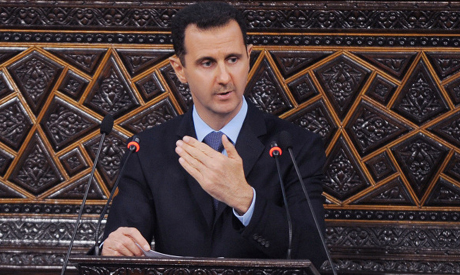
In this photo released by the Syrian official news agency SANA, Syrian President Bashar Assad speaks at the Parliament, in Damascus, Syria, Wednesday, 30 March 2011. (AP)
Syrian opposition movements are readying Friday for protests after Muslim prayers, their first since President Bashar Al-Assad thwarted their hopes for greater freedoms in a long-awaited speech.
"The real cause, the ultimate cause, is that we have been... beaten in our own streets, silenced, for more than 40 years," said one activist, who preferred to remain anonymous.
"But the most pressing cause, in today's rallies, is the president's speech, which dashed all our hopes and expectations," he told AFP. "We have been hearing the same speech for decades."
The protests are being staged after weekly Muslim prayers for a third week in succession.
Assad, who is facing domestic pressure unprecedented in his 11-year rule, failed to lift almost 50 years of emergency rule on Wednesday in his first address to the nation since the protests demanding greater freedoms erupted more than two weeks ago.
He instead said there was a "conspiracy" targeting unity in Syria, blaming the country's "enemies" for taking advantage of the needs of the people to incite division in the country ruled by emergency law since the Baath party seized power in 1963.
The Syria Revolution 2011, a wildly popular yet anonymous Facebook group that has emerged as a motor of the protests, has called for rallies at all mosques after noon prayers until their demands for "freedom" are met.
It offered tips on Friday for sending out mass text messages and protection from tear gas.
The protests have turned deadly, however, with activists estimating more than 160 people killed in clashes with security forces, mainly in the southern governorate of Daraa, a tribal area at the Jordanian border, and the coastal city of Latakia.
While small protests initially surfaced in the capital Damascus, they were quickly contained by Syria's notorious security forces.
AFP reporters have witnessed activists being dragged away from Friday rallies during the past two weeks.
Officials put the death toll at about 30 and have accused Muslim extremists and "armed gangs" of pushing peaceful rallies into violence with the aim of inciting sectarian unrest in Syria, which prides itself on coexistence in a region torn by confessional strife.
In a conciliatory move, the president on Thursday ordered a string of reforms, including a study of new laws on the media and political pluralism and plans to tackle the plight of 300,000 Kurds who have been denied Syrian citizenship for close to half a century.
Assad also announced salary and pension increases for state employees, worth an estimated 800 million dollars for the year 2011.
He has also ordered an immediate investigation into the Daraa and Latakia killings and the formation of a committee to draft new laws on national security and counter-terrorism.
The committee would "pave the way for ending the state of emergency" and should complete its work by April 25, according to the news agency.
Assad aide Buthaina Shaaban had told AFP the government intended to lift the state of emergency, which authorises the arrest and interrogation of any individual and restricts gatherings and movement, but she could not say when.
The government of prime minister Mohammed Naji Otri on Tuesday tendered its resignation, and a new cabinet is expected to be unveiled in days, tasked with implementing the reforms.
Yet the state's attempt to reach out to protesters has failed to impress domestic opposition movements and rights groups, who say the president has missed a golden opportunity to improve the Syria's human rights record.
"If President Assad is unwilling to take the legal muzzle off Syrians’ mouths and to end the tyranny of its Security Courts, then he’s not serious about reform," said Sarah Leah Whitson, Middle East director at Human Rights Watch.
Philip Luther, Amnesty International’s Deputy Director for the Middle East and North Africa, said Assad should be "addressing the real problem -- which is that his security forces have been firing live ammunition on protesters, killing dozens over the last month."
The United States, which says at least five of its citizens were being held by Syrian authorities, has urged Americans to avoid travel to Syria and advised those already there to consider leaving.
Short link: